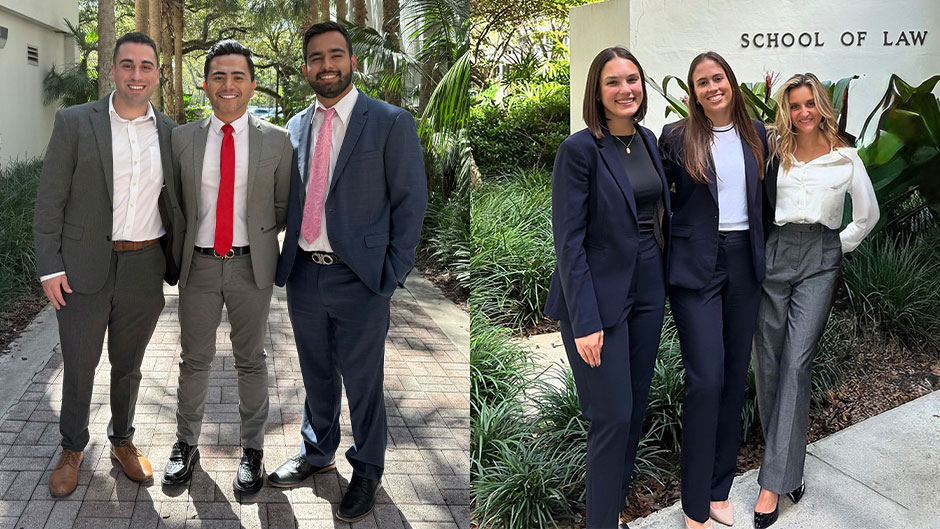Established in the fall of 2009, the Immigration Clinic, directed by professor Rebecca Sharpless, provides a challenging opportunity for students to advocate on behalf of immigrants in a wide variety of complex immigration proceedings. In addition to helping individual clients, students collaborate with other immigrant rights groups on projects that reform the law and advance the cause of social justice for immigrants.
In just the past few months, University of Miami School of Law students acquired first-hand skills in immigration law—a unique opportunity available in Miami with two immigration courts and three immigration detention centers within two hours of campus.
Miami Law students attended hearings, wrote legal briefs, conducted direct examinations of clients in immigration court, created court exhibits and pretrial memos, argued before a judge, and overall developed creative legal strategies to best represent their clients.
Students win asylum case in court
Second-year students Joseph Korzeb, David Raez, and Sergio Alejandro Villatoro successfully defended a detained man in immigration court, halting his deportation. The students litigated the case from start to finish at Krome Immigration Court located at Krome Service Processing Center in Miami.
The client had been held hostage and attacked in an alleged homophobic hate crime, with his pleas for protection ignored by the police. Under the law, a person is entitled to asylum if they have suffered past persecution or have a well-founded fear of future persecution because of a protected ground, including a particular social group.
“I empathized with our client's profound suffering, shared his anger and frustration with a broken detention and immigration system, and rejoiced alongside him upon sharing the news that he won his case and was granted asylum,” said Korzeb of the hate crime case. “We developed our client's case from scratch, wrote a legal brief, found experts, conducted direct examinations, and objected on the record.”
“While meeting with our client, we witnessed the harsh conditions detained people face every day,” said Raez. “As the son of immigrant parents, I have witnessed the struggles many immigrants face.”
As a result of the students' work, under the supervision of Andrea Jacoski, associate director of the clinic, the client was released after more than nine months in detention. “This case illustrates the power of law students and the value of experiential learning,” said Jacoski, “The case involved two merits hearings and four witnesses. It was an advanced case, even for a seasoned attorney. I am truly impressed by the students and proud of their hard work. This outcome is well deserved, and I couldn’t be happier for our client.”
Students secure victory
In another deportation case, an Immigration Clinic client was scheduled to be returned to her Central American country, which lists among the highest murder rates of transgender people in the world.
Second-year law students Lauren Rasco, Maria Rios, and Olivia Sabates were successful in arguing that returning their client to her homeland would endanger her safety. The client had previously suffered persecution in her native country due to her gender identity.
Following a three-hour bench trial and opposition from the government, the woman's deportation was stopped.
“Working on this case…I am grateful to have been part of the team that helped her avoid returning to life-threatening conditions,” said Rios.
Throughout the fall semester, the students traveled each week to meet with their client in detention and recruited two expert witnesses to support the case. They submitted 33 exhibits and a 24-page pretrial memorandum of law to argue their client's claim.
“This was an unforgettable experience working with an amazing team and a resilient client,” said Rasco. “The most rewarding part of this experience was achieving a favorable outcome at the final merits hearing, after months of preparation and hard work.”
In court, the students argued legal points, introduced evidence, and conducted a lengthy direct examination of their client. Teamwork was essential to the success of the case.
“Working on this case taught me not only how to advocate for someone who has endured significant trauma, but also how to approach challenges with resilience and strategy,” said Sabates.
Experiences help students grow into legal professionals
Working on cases in the Immigration Clinic provides amazing learning opportunities for students to parlay into jobs and be more confident going into the legal profession.
In deportation cases, in addition to developing advocacy skills arguing before a judge, the students honed their legal capabilities.
Said Sabates, “My legal writing skills have improved significantly. I now feel much more confident in crafting persuasive arguments within the bounds of legal standards and expectations. These experiences have strengthened my ability to think on my feet, communicate clearly under pressure, and present compelling arguments in a courtroom setting. Overall, I feel far more prepared to apply the knowledge and skills I’ve gained in the clinic to my next job and throughout my legal career.”
In short, 2L Korzeb sums up the satisfaction of working in the Immigration Clinic: “There is nothing more rewarding than walking alongside someone on their path to freedom.”
Read more about Miami Law’s Clinics.

